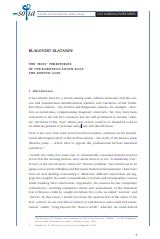
The Nationalization of Philosophy: Constructing a Bulgarian »National Ontology« in the Interwar Period
The key problem of most of the social and political thought that emerged in Bulgaria from the late-nineteenth century up to the establishment of the post-WW II communist regime was the constantly evoked “paradox of development.” While civilizational advancement was the overall aim of the nation- building project,2 it also meant social differentiation, the collapse of the traditional life-world of the peasantry and of the entrepreneurial layer that emerged in the mid-nineteenth century using the economic structures of the Ottoman Empire. This posed a series of dilemmas concerning the identity of the community. On the one hand, modernization implied a growing distance between the emerging “nationalized” middle-class and the rural population; it also raised the question of how to transmit this “national” culture to the masses. On the other hand, it meant the relativizing of traditional role-models, threatening the newly-formed nation-state with apparent chaos caused by the permanent dislocation of the principal actors, leading to “misunderstood” forms and veritable mutations of the Western civilizational framework. [...]
More...